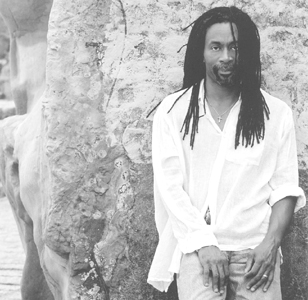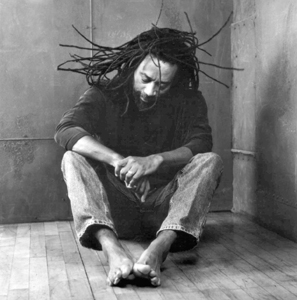![[Metroactive Music]](/music/gifs/music468.gif)
[ Music Index | Santa Cruz Week | SantaCruz Home | Archives ]
Sing Your Life
Vocal genius Bobby McFerrin likes to get stage fright and hates people who suck the fun out of Mozart
By Adam Cotton
"Musicians can get so caught up in the seriousness of music-making. They forget that Mozart was a really joyful man--he had a lot of fun," says Bobby McFerrin by phone from his Philadelphia home. "Musicians play for a living. Remember that, to think of that word, play. We play our instruments. We play music."
Anyone who's seen McFerrin perform knows that he is indeed very serious about having fun. And it's undeniable that his merriment is very contagious.
McFerrin, who performs Monday at the Santa Cruz Civic Auditorium, is a phenomenon in the music world. A 10-time Grammy Award winner, he is the world's foremost vocal innovator and improviser, a highly sought after classical conductor and a passionate spokesman for music education, not to mention the creator of one of the catchiest songs of the 20th century, "Don't Worry, Be Happy" His collaborations with Yo-Yo Ma, Chick Corea, the Vienna Philharmonic and Herbie Hancock have established him as an ambassador of both the classical and jazz worlds.
Not your everyday singer, McFerrin has an incredible four-octave range (that's 48 keys long on a piano) and a vast array of contrasting vocal techniques. His explorations as a vocalist and composer have combined jazz, folk, rock, spiritual, choral, a cappella, classical and a multitude of world music influences.
How Can I Keep From Singing?
McFerrin, born to opera singer parents in New York in 1950, was vibrating in song long before he saw the light of day. His father was the first African American male soloist at the Metropolitan Opera. At home, his parents would sing, teach and entertain guests with jazz standards. McFerrin, who was taking music theory lessons by age 6, mischievously enjoyed hiding under the piano while his dad was teaching, listening to the strange dulcimer-like poundings of notes from beneath the soundboard. Growing up, he learned piano, clarinet and flute.
It wasn't until age 27 that he was suddenly struck with the idea of being a singer. Soon after, he was inspired by the completely improvised solo concerts of pianist Keith Jarrett.
"I came up with this crazy idea just to walk out on the stage with no band at all and just start singing whatever came to mind," says McFerrin. "I actually fought the idea for a while because it seemed almost too radical."
In 1983, however, when he did his first tour of Europe as an unaccompanied vocalist, he did in fact walk out on stage with absolutely nothing prepared. By '88, he had a solid following and a few Grammys under his belt, but was still somewhat unknown to the general public. One day in the recording studio, he became frustrated while working on a track and decided to take a break. On his break, he wrote some lyrics and improvised a light-hearted melody to take his mind off things.
The result, "Don't Worry, Be Happy," wasn't even supposed to be on the album. Completely finished in less than an hour, the song catapulted him to worldwide recognition. Surprised by this grand reception, he did the exact opposite of what was expected of someone with their first pop hit: he turned down numerous big-money offers, dropped out of the public eye and went back to his house to spend time with his family and take conducting lessons.
In 1990, he made his first appearance with the San Francisco Symphony Orchestra, conducting Beethoven's Seventh. By 1994, he had been named creative director of the St. Paul Chamber Orchestra and was being invited all over the world as a guest conductor.
Even Vocal Superstars Get the Jitters
Along with the orchestral gigs, McFerrin has kept touring as a solo improviser, always making his audience a part of the show.
"When I'm riffing along on something, and I find something that I think the audience can help me out with, I generally give them that part," he says. You'd think going onstage with absolutely no clue what he's going to do in front of a large crowd of people who paid good money to see him might be a little nerve-racking, and well, actually, you're right.
"I'm always nervous," admits McFerrin, "and I wanna be, because that means I care enough about what I'm doing."
He says there was actually a point in his career where he stopped getting nervous, "and so I stopped performing for a while so that I could get the jitters back, because I felt like I wasn't giving a hundred percent."
So, what goes through his head when he's up there?
"I don't think about anything during my concerts," he says, "nothing at all except the music that I'm doing. I try not to think about the audience. I try not to perform, you know. I try only to sing, to be as relaxed as possible about it, to be completely nonchalant and naive about the whole process, without really thinking about what I'm doing, why I'm doing it. I don't have an agenda, you know what I mean, nothing like that. I fight those kinds of thoughts. I fight them off like I'm trying to keep an enemy out of my house. I think that they just get in the way of musical integrity."
McFerrin sees himself and other musicians as being here "to lift the spirits of humanity, to feed the soul. That's what our main job is." A strong believer in the healing power of music, McFerrin sees his performances as opportunities for the audience and sometimes even the performer to rise above and transform emotions and even physical symptoms.
"I like to think that our task as musicians is transcendence," he says. "When you're performing in front of people, you don't want them to leave the same way they came in. You know, sometimes when you go to a concert, your heart is closed for one reason or another, you had a fight with your spouse, you just got fired from your job, one of your kids is sick, they cancelled your favorite TV show, who knows. So you're dragged to this concert kicking and screaming, and then all of a sudden something happens, and you're completely changed."
But what if it's McFerrin himself who had the bad day before the concert?
"I think I'd rather [perform]," he says, "than sit around and mope and feel sorry for myself, or have my own pity party or get trapped in my own emotions. When I'm confused or angry or upset or something, when my temper is a little bit unbalanced, singing is a really good therapy for me."
McFerrin, who has been married to his wife Debbie for almost 30 years and has two sons, says that beyond everything else, he values his family life and being a normal guy and doing normal things in his off time, which he makes sure he has plenty of.
"You know, when you're a celebrity, people just love you, but they don't know you. You go out there and they just love you to death, you know, you're applauded up and down. You lift up a glass of water to take a drink, and they applaud that. You take off your shoes and they applaud, you know, its just incredible!" he says. "It's a crazy, crazy unrealistic life. Your family is what's real, what's supporting you. They know all of your quirks and annoying little habits and they put up with you on a daily basis."
Copyright © Metro Publishing Inc. Maintained by Boulevards New Media.
For more information about Santa Cruz, visit santacruz.com.
![]()

Kid and Play: Bobby McFerrin can't stand it when musicians forget they're suppposed to be 'playing' for a living.

If It's Nerves, It Must Be Showtime: McFerrin finds it so important to be nervous in front of his audience that he actually stopped performing for a while when he got too comfortable.
Bobby McFerrin performs Monday, April 19, at 8pm at the Santa Cruz Civic Auditorium. Tickets are $30/$27 adults, $25 students and seniors with ID, $50/$45 gold circle, available through the Santa Cruz Civic Auditorium box office at 831.420.5260 or Ticketmaster at 408.998.8497.
From the April 14-21, 2004 issue of Metro Santa Cruz.